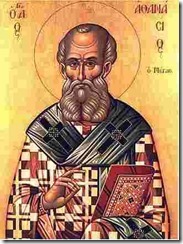 “Nor indeed (in Anselm’s Cur Deus Homo) is there any suggestion made that God is appeased by the “penal” death of Christ. . . . Anselm certainly depicts Christ’s sacrifice as an offering that somehow “secures” forgiveness by satisfying the demands of divine righteousness, on our behalf; but how far does this really depart from the accounts offered by Anselm’s more remote precursors? When Lossky points to a thinker like Athanasius, in order to call attention to the divergence of Anselm’s model from its patristic predecessors, even while acknowledging the presence of many of the themes of Cur Deus Homo in Athanasius’s thought, the irony is peculiarly keen.
“Nor indeed (in Anselm’s Cur Deus Homo) is there any suggestion made that God is appeased by the “penal” death of Christ. . . . Anselm certainly depicts Christ’s sacrifice as an offering that somehow “secures” forgiveness by satisfying the demands of divine righteousness, on our behalf; but how far does this really depart from the accounts offered by Anselm’s more remote precursors? When Lossky points to a thinker like Athanasius, in order to call attention to the divergence of Anselm’s model from its patristic predecessors, even while acknowledging the presence of many of the themes of Cur Deus Homo in Athanasius’s thought, the irony is peculiarly keen.
 At one juncture in De incarnatione, Athanasius, lamenting the loss of humanity’s original beauty in the fall, argues that redemption was necessitated by God’s agathotes (consistency, righteousness, honor, glory), which requires the maintenance and execution of his twin decrees that, on the one hand, humanity will share in the divine life and that, on the other, death must fall upon the transgressors of holy law; to prevent the second decree from defeating the first, guilt must be removed from humanity through the exhaustion of the power of death in Christ’s sacrifice (7.I-4). The hold death had on us was just, says Athanasius, and it would be monstrous were God’s decree that sin shall merit death to prove false (6.2-3); but it would be unworthy of God’s goodness were he to let his handiwork come to nothing (6.4-I0). Nor could God simply accept our repentance as just recompense for our offense, as repentance would neither suffice to guard God’s integrity nor serve to restore our wounded nature (8.3). In his body, then, Christ exhausts the wrath of the law (8.4; 10.5) and renders satisfaction for our debt (9.I-3).
At one juncture in De incarnatione, Athanasius, lamenting the loss of humanity’s original beauty in the fall, argues that redemption was necessitated by God’s agathotes (consistency, righteousness, honor, glory), which requires the maintenance and execution of his twin decrees that, on the one hand, humanity will share in the divine life and that, on the other, death must fall upon the transgressors of holy law; to prevent the second decree from defeating the first, guilt must be removed from humanity through the exhaustion of the power of death in Christ’s sacrifice (7.I-4). The hold death had on us was just, says Athanasius, and it would be monstrous were God’s decree that sin shall merit death to prove false (6.2-3); but it would be unworthy of God’s goodness were he to let his handiwork come to nothing (6.4-I0). Nor could God simply accept our repentance as just recompense for our offense, as repentance would neither suffice to guard God’s integrity nor serve to restore our wounded nature (8.3). In his body, then, Christ exhausts the wrath of the law (8.4; 10.5) and renders satisfaction for our debt (9.I-3).
Already present in Athanasius’s theology is the very story whose inner shape Anselm will, in a moment of intense critical reflection, attempt to grasp as necessity. Far from an arbitrary arrangement of jurisprudential transactions calculated to effect a kind of forensic reconciliation between humanity and God, the atonement as Cur Deus Homo depicts it is an assumption of solidarity with us by an infinitely merciful God in order to fulfill in us that beatitude intended in our creation (2.1), by accomplishing on our behalf what, in our impotence to do good and in his unwillingness to employ unjust means (1.12), could never otherwise have been brought to pass.”
Taken from David Bentley Hart, Beauty of the Infinite (see pgs 463-467)
Leave a Reply
You must be logged in to post a comment.